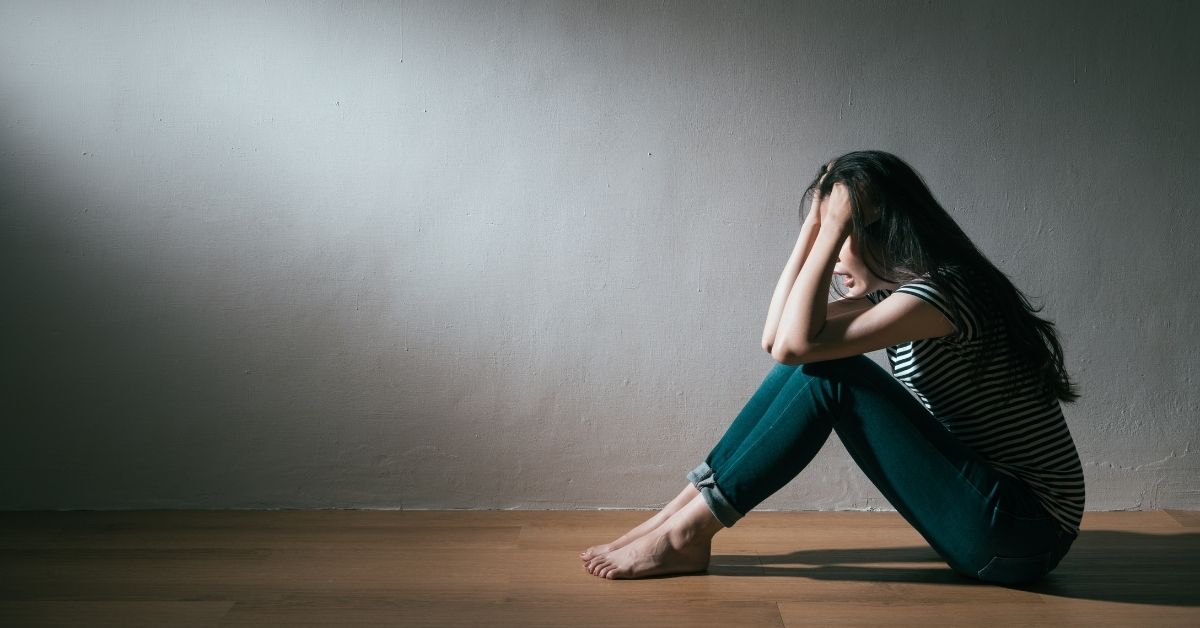There is a common misconception about depression. People tend to think that those suffering from depression are there due to their own choices to think negatively. We are used to saying “I am depressed” when we feel lots of sadness. However, there is more to depression than feeling sadness.
What is depression?

People suffering from depression deal with an extreme amount of anxiety each day. This constant state of anxiety can lead to hormonal imbalances and physiologically affect multiple bodily functions.
Depression is a mood disorder characterized by the extreme feeling of defeat, anxiety, persistent sadness, hopelessness, and guilt. There are multiple types of depression. The most commonly diagnosed one is Major Depressive Disorder. Depression is also a characteristic feature seen in those suffering from bipolar disorder.
Symptoms
Below are some common symptoms of depression. Do keep in mind that not all symptoms will occur in all patients. The extremity of each symptom might also vary from individual to individual.

- Persistent sadness
- Constant anxiety
- Feeling empty
- Low mood
- Hopelessness
- Negative or pessimistic thought
- Loss of interest
- Reduced pleasure in hobbies/leisure
- Decreased energy
- Lethargy/fatigue
- Difficulty concentrating
- Difficulty making decisions
- Suicidal thoughts
- Disruptions in sleep
- Reduced appetite
- Headaches
Causes

Most people believe that depression occurs when one goes through sad events in their life. This is only true to the extent in saying that tragic events can trigger depressive thoughts. However, there is more to the cause of depression than this.
Depression is caused by a combination of factors; genetic, environmental, biological, and psychological factors. Tragic events such as a loss of a loved one can trigger depressive episodes. However, this does not mean depression is a consequence of a series of negative life events.
Numerous research studies have found that the functionality of the brain in terms of mood, sleep, appetite, and thought, is abnormal in those suffering from depression. One may develop or genetically inherit these abnormalities.
Hormones
One key biological factor that progresses depression is hormonal imbalance. The inability of the body to maintain normal levels of bodily hormones such as dopamine and serotonin can lead to feelings of extreme sadness and constant low mood.
The metabolism of dopamine requires good nutritional building blocks. Your body needs ample amounts of the following vitamins and minerals to create dopamine:
- Iron
- Niacin
- Folate
- Vitamin B6
Recovering

Having a deficiency in one or more of these nutrients may disrupt your body’s ability to produce dopamine. You can identify whether you have any of these deficiencies by running a non-invasive bio-resonance test. If you do have these deficiencies, you can provide your body with foods rich in these nutrients.
However, there is a nutrient debt owed to the body. Therefore, you may need to take some natural supplements for a couple of months to boost the process. After which, you should depend on a good and healthy diet to upkeep these nutrient levels. There is a set of nutrients on top of the above nutrients that the body requires to lead a disease-free life. You can read more about these here.
Depression and Health

Mental health can also affect physiological health. People suffering from depression are three times more likely to experience cardiovascular issues. The immune system is also weakened. This increases the susceptibility to viral and bacterial infections. This also means there is a reduction in the body’s ability to fight and prevent cancers.
As anxiety is a common symptom among people with depression, they are likely to constantly be in “fight or flight” mode. This is a mechanism that the body undergoes in times of threat (extreme anxiety) in order to prioritize our survival. In this state, the body allocates all its resources into getting through the current threat. This means that other bodily functions and the health of organs are neglected. Therefore, being in this mode constantly leads to many complications of the body ranging across a variety of diseases.
Effect of exercise on depression

If you or someone you know suffers from depression, you can try exercise as a method to fight depression. High-intensity exercise stimulates a release of endorphins which are known as feel-good chemicals. Low-intensity exercise too has benefits. It triggers the release of growth factors that allow nerve cells to grow and extend their connections in the brain. Therefore, improving brain function. This allows people with depression to overcome the poor regulation of mood and other brain functions over time.

Below are some examples of exercise activities you may try. You can try them with a friend to increase your motivation.
- Jogging/running
- Lifting weights
- Yoga
- Tai Chi
- Walking
- Biking
- Dancing
Harmful effects of Antidepressants

Antidepressants are psychiatric medications often given to people suffering from depression. They work by changing the levels of neurotransmitters in the brain leading to mood elevation. Although this allows temporary relief from the low mood and constant negativity, you need to be aware of the harmful side effects that will follow. Listed below are some common side effects:
- Anxiety
- Dizziness
- Blurred vision
- Insomnia
- Nausea
- Weight gain
Apart from these instantaneous effects, you also need to be specially made aware of the prolonged effects. As you may know, drugs alter brain function permanently. In the case of psychotropic drugs, this too needs to be considered. When you begin to give your brain neurotransmitters externally, it becomes dependent on your external provision and stops trying to produce even the little it was capable of producing. This leads to you depending on the medicine over your lifetime.
Final thoughts

Just imagine if your body had the right resources (building blocks) to put together what it needs. You will not be suffering from all these problems. It is because we do not provide our bodies with sufficient nutrition that it is crying out for help in the form of diseases and disorders. Depression is just one way that the body does this.
Therefore, the best way to deal with depression is to firstly, get social support from friends and family who will support you emotionally. Secondly, take a set of completely natural supplements to cover the nutritional debt you owe your body. Thirdly, stay active, exercise and hydrate while you wait for your body to use the resources you provided and return to normal. Lastly, think positively. Have faith in your body that it is able and will eventually heal you from the inside out.
Share this article with others and help them understand this critically misunderstood issue. You may never know, whoever sent you this might have just saved your life!

